汉英词语比较与翻译
中文常见成语的英文翻译与英汉差异

中文常见成语的英文翻译与英汉差异爱屋及乌Love me, love my dog.百闻不如一见One look is worth a thousand words.比上不足,比下有余To fall short of the best, but be better than the worst.笨鸟先飞A slow sparrow should make an early start.不遗余力Spare no effort; go all out; do one's best.不打不成交No discord, no concord.拆东墙补西墙Rob Peter to pay Paul.辞旧迎新Bid farewell to the old and usher in the new.大事化小,小事化了Try first to make their mistake sound less serious and then to reduce it to nothing at all.大开眼界Broaden one's horizon; be an eye-opener.国泰民安The country flourishes and people live in peace.过犹不及Going beyond the limit is as bad as falling short;excess is just as bad as deficiency;too much is as bad as too little.好了伤疤忘了疼Once on shore, one prays no more.好事不出门,坏事传千里Bad news travels fast.和气生财Harmony brings wealth;friendliness is conducive to business success.活到老学到老Never too old to learn.既往不咎Let bygones be bygones.金无足赤,人无完人There are spots even on the sun.金玉满堂Treasures fill the home.脚踏实地Be down-to-earth.脚踩两只船Sit on the fence; be a fence-sitter; have a foot in either camp. 君子之交淡如水A hedge between keeps friendship green.已成定局Cut and dried.礼尚往来Courtesy calls for reciprocity.留得青山在,不怕没柴烧Where there is life, there is hope.马到成功Achieve immediate victory; win instant success.名利双收Gain both fame and wealth.茅塞顿开Be suddenly enlightened.没有规矩,不成方圆Nothing can be accomplished without norms or standards.每逢佳节倍思亲On festive occasions more than ever one thinks of one's dear ones far away. 谋事在人,成事在天Man proposes; God disposes.弄巧成拙Make a fool of oneself in trying to be smart.赔了夫人又折兵Suffer a double loss; lose the bait along with the fish.抛砖引玉A modest spur to induce others to come forward with valuable contributions; throw a sprat to catch a mackerel.破釜沉舟Cut off all means of retreat;burn one's own way of retreat and be determined to fight to the end.抢得先机Take the preemptive opportunities.巧妇难为无米之炊One can't make bricks without straw.千里之行始于足下A thousand-li journey begins with the first step--the highest eminence is to be gained step by step.前事不忘,后事之师Past experience, if not forgotten, is a guide for the future.前怕狼,后怕虎Fear wolves ahead and tigers behind; hesitate in doing something.强龙难压地头蛇The mighty dragon is no match for the native serpent.瑞雪兆丰年A fall of seasonal snow gives promise of a fruitful year.人逢喜事精神爽People are in high spirits when involved in happy events.世上无难事,只怕有心人Where there is a will, there is a way.世外桃源A retreat away from the turmoil of the world.人之初,性本善Humans are born good.上有天堂,下有苏杭Just as there is paradise in heaven, there are Suzhou and Hangzhou on earth 塞翁失马,焉知非福A blessing in disguise;Every cloud has a silver lining.三十而立A man should be independent at the age of thirty. /At thirty, a man should be able to think for himself.水涨船高A ship rises with the tide时不我待Time and tide wait for no man.杀鸡用牛刀Use a steam-hammer to crack nuts.实事求是Seek truth from facts; be practical and realistic; be true to facts.说曹操,曹操到Speak of the devil.实话实说Speak the plain truth; call a spade a spade; tell it as it is.实践是检验真理的唯一标准Practice is the sole criterion for testing truth.韬光养晦Hide one's capacities and bide one's time.糖衣炮弹Sugar-coated bullets.天有不测风云Anything unexpected may happen. a bolt from the blue.团结就是力量Unity is strength.跳进黄河洗不清Even if one jumped into the Yellow River, one can not wash oneself clean - there's nothing one can do to clear one's name歪风邪气Unhealthy trends and vulgar practices.物以类聚,人以群分Birds of a feather flock together.望子成龙Hold high hopes for one's child.唯利是图Seek nothing but profits; be blind to all but one's own interests.无中生有A sheer fabrication out of nothing; fabricate rumors out of thin air.无风不起浪There are no waves without wind. Nothing comes of nothing.徇私枉法Twist the law to suit one's own purpose.新官上任三把火A new broom sweeps clean.蓄势待发Accumulate strength for a take-off.心想事成May all your wish come true.心照不宣Have a tacit understanding; thoroughly understand each other, without havingexchanged a word of explanation.先入为主First impressions are firmly entrenched.先下手为强He who strikes first gains the advantage.The best defense is offense.热锅上的蚂蚁Ants on a hot pan现身说法Warn people by taking oneself as an example.息事宁人Pour oil on troubled waters; patch up a quarrel and reconcile the parties concerned. 循序渐进Proceed in an orderly way and step by step; advance gradually in due order.严以律己,宽以待人Be strict with oneself and lenient with others.有情人终成眷属Jack shall have Jill, all shall be well.有钱能使鬼推磨Money makes the mare go./ Money talks.有识之士A man of insight.有勇无谋Bold but not crafty.有缘千里来相会Separated as we are thousands of miles apart, we come together as if by predestination.与时俱进Keep pace with the times.以人为本People-oriented.因材施教Teach students according to their aptitude.欲穷千里目,更上一层楼To ascend another storey to see a thousand miles further; Ascend further, were you to look farther.欲速则不达Haste makes waste.More haste, less speed.优胜劣汰Survival of the fittest.英雄所见略同Great minds think alike.冤家宜解不宜结Better make friends than make enemies.冤假错案Cases in which people were unjustly, falsely or wrongly charged or sentenced; unjust, false or wrong cases.一言既出,驷马难追A promise is a promise.A real man never goes back on his words.招财进宝Bring in wealth and treasure.债台高筑Become debt-ridden.众矢之的Target of public criticism.纸上谈兵Be an armchair strategist.纸包不住火You can't wrap fire in paper.What's done by night appears by day.左右为难Caught in a dilemma; between the devil and the deep blue sea.英语学习应注意的英汉差异英语重形合(hypotaxis),汉语重意合(parataxis) 。
英汉对比与翻译(全)
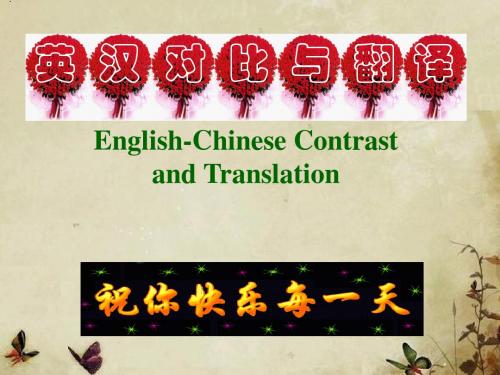
Examples of Negative Transfer
5、他建议我接受这个报价。 He suggested me to accept this offer . He suggested that I (should) accept this offer . He suggested my (me) accepting this offer .
英 汉 对 比 与 翻 译
English-Chinese Contrast and Translation
英 汉 对 比 与 翻 译
Three Parts
1. Language transfer 2. Linguistic contrast 欢迎光临 3. Contrast and translation
Causes: • analogical use of one‟s prior knowledge of the mother tongue 母语先知结构的类推运用 • scanty knowledge of differences between the two languages 对两种语言的差异所知甚少 • unconscious falling back on the mother tongue speech habit 不自觉地回归母语的言语习惯
Keen awareness of the similarities and differences between the two languages can facilitate FL learning. 对两种语言相似与相异点的敏锐意识能促进外语学习。
Negative Transfer (负迁移): Interference (干扰)
Please translate the following:
英汉成语的比较与翻译
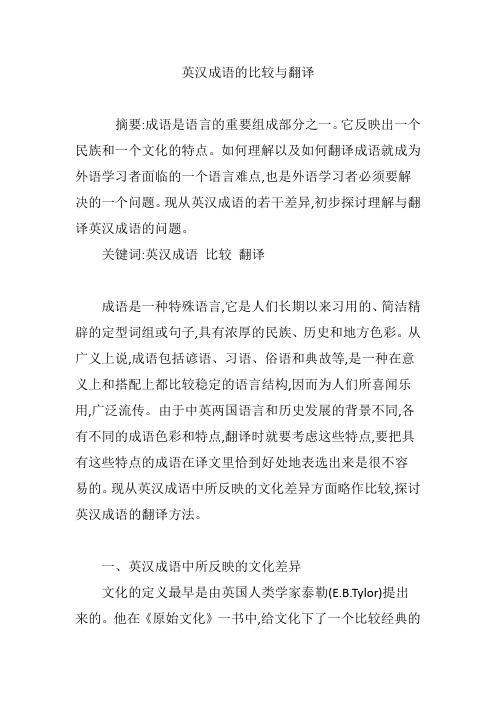
英汉成语的比较与翻译摘要:成语是语言的重要组成部分之一。
它反映出一个民族和一个文化的特点。
如何理解以及如何翻译成语就成为外语学习者面临的一个语言难点,也是外语学习者必须要解决的一个问题。
现从英汉成语的若干差异,初步探讨理解与翻译英汉成语的问题。
关键词:英汉成语比较翻译成语是一种特殊语言,它是人们长期以来习用的、简洁精辟的定型词组或句子,具有浓厚的民族、历史和地方色彩。
从广义上说,成语包括谚语、习语、俗语和典故等,是一种在意义上和搭配上都比较稳定的语言结构,因而为人们所喜闻乐用,广泛流传。
由于中英两国语言和历史发展的背景不同,各有不同的成语色彩和特点,翻译时就要考虑这些特点,要把具有这些特点的成语在译文里恰到好处地表选出来是很不容易的。
现从英汉成语中所反映的文化差异方面略作比较,探讨英汉成语的翻译方法。
一、英汉成语中所反映的文化差异文化的定义最早是由英国人类学家泰勒(E.B.Tylor)提出来的。
他在《原始文化》一书中,给文化下了一个比较经典的定义:“文化是一个复合体,其中包括知识、信仰、艺术、法律、道德、风俗以及人作为社会成员而获得的任何其他能力和习惯。
”语言是文化的载体,每一种语言都具有民族文化的烙印。
英汉成语的若干差异主要表现在以下几个方面:1. 社会习俗上的差异风俗习惯的差异是文化差异的一个主要方面,在成语当中有较多的反映,特别是在动物形象上。
例如:英语中的dog被视为一种宠物,英国人普遍对狗有好感,很多家庭都养狗,由此产生了一些与狗有关的成语。
如:Love me,love my dog(爱屋及乌),top dog(重要的人),Every dog has his day(凡人皆有得意日)等。
而汉语中的狗则多带有贬义色彩,常用来形容和比喻坏人坏事。
例如:狗仗人势、狗胆包天、狼心狗肺等等。
不同的民族心理对不同的事物做出了迥异的价值取向。
在中国传统文化中,龙象征着吉利,汉语中与龙有关的成语一般都含褒义。
英汉对比与翻译(全)

语义型与形态型
Please translate the following:
不要人云亦云。 Don‟t say what others have said. 这件事,你做也好,他做也罢,我看谁都做不好。 Whether you do the matter or he does it, I‟m afraid neither will do it well. 支农惠农政策不断加强。 Policies were constantly strengthened to support and benefit agriculture. 必须采取措施在石油资源耗尽之前开发新能源。 Measures must be taken to develop new energy resources before petroleum resources are used up.
Zuo Biao
英 汉 对 比 与 翻 译
Three Parts
1. Language transfer (语言迁移) 2. Linguistic contrast(语言对比) 欢迎光临 (对比与翻译) 3. Contrast and translation
Part One
Language Transfer in FL Learning: Interference or Facilitation?
Two Typesnsfer • Positive Transfer (负迁移) (正迁移) Errors arise from Errors decrease by analogy. analysis. 类推会产生错误。 分析能减少错误。
Keen awareness of the similarities and differences between the two languages can facilitate FL learning. 对两种语言相似与相异点的敏锐意识能促进外语学习。
英汉词语的对比与翻译

增补译法
(1) The equipment should enter production in 2000 with first deliveries being made in 2001. (2) The project has been considerably speeded up. (3) According to the U.S. Commerce Department, the United States foreign debt swelled to $ 263.3 billion in 1986, up from $ 111.9 billion in 1985. (4) The purpose of engineering is to create useful goods, to make them better, cheaper and more abundant. (5) Both the buyer and the seller are busy at negotiations of business, contract and draft. (6) A foreign trade staff must have a good foundation in economics, mathematics, statistics, accounting and intercultural communication.源自
(4) The purpose of engineering is to create useful goods, to make them better, cheaper and more abundant. 工程的目的是要创造有用的物品,使他们的质量更好, 价格更便宜,数量更充足。(语义搭配需要) (5) Both the buyer and the seller are busy at negotiations of business, contract and draft. 买卖双方正忙于交易磋商,合约谈判和汇票议付。 (6) A foreign trade staff must have a good foundation in economics, mathematics, statistics, accounting and intercultural communication. 一位外贸人员必须在经济学,数学,统计学,会计学 和文化交际等五个方面具有良好的功底。(增加范畴 词,表概括)
英汉对比与翻译期末复习指南
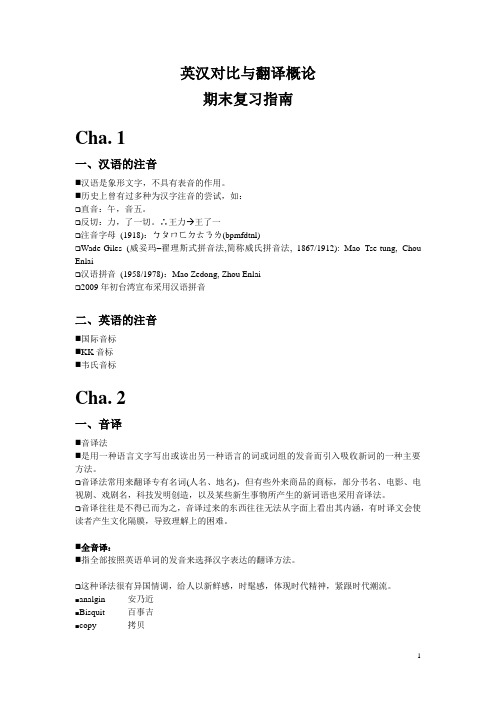
英汉对比与翻译概论期末复习指南Cha. 1一、汉语的注音⏹汉语是象形文字,不具有表音的作用。
⏹历史上曾有过多种为汉字注音的尝试,如:❑直音:午,音五。
❑反切:力,了一切。
∴王力→王了一❑注音字母(1918):ㄅㄆㄇㄈㄉㄊㄋㄌ(bpmfdtnl)❑Wade-Giles (威妥玛–翟理斯式拼音法,简称威氏拼音法, 1867/1912): Mao Tse-tung, Chou Enlai❑汉语拼音(1958/1978):Mao Zedong, Zhou Enlai❑2009年初台湾宣布采用汉语拼音二、英语的注音⏹国际音标⏹KK音标⏹韦氏音标Cha. 2一、音译⏹音译法⏹是用一种语言文字写出或读出另一种语言的词或词组的发音而引入吸收新词的一种主要方法。
❑音译法常用来翻译专有名词(人名、地名),但有些外来商品的商标,部分书名、电影、电视剧、戏剧名,科技发明创造,以及某些新生事物所产生的新词语也采用音译法。
❑音译往往是不得已而为之,音译过来的东西往往无法从字面上看出其内涵,有时译文会使读者产生文化隔膜,导致理解上的困难。
⏹全音译:⏹指全部按照英语单词的发音来选择汉字表达的翻译方法。
❑这种译法很有异国情调,给人以新鲜感,时髦感,体现时代精神,紧跟时代潮流。
⏹analgin 安乃近⏹Bisquit 百事吉⏹copy 拷贝⏹Delicious 得利斯⏹Fiyta 飞亚达⏹Kodak 柯达⏹Ford 福特⏹Lactov 乐口福⏹Lucky 乐凯⏹Paloma 百乐满⏹party 派对⏹Polaroid 宝利莱⏹salad 色拉⏹shampoo 香波⏹toast 吐司⏹部分音译部分意译:⏹指在英语名词音译前或后再加上说明性文字,让人们知道该名称的性质是什么。
❑但随着该词的流行和接受程度,意译部分逐渐淘汰,弃而不用。
⏹B owling 保龄球⏹Cookies 曲奇饼⏹Clean & Clear 可伶可俐洗面奶⏹Disco 迪斯科舞⏹Jacket 夹克衫⏹Golf 高尔夫球⏹Good 古德面包⏹Head & Shoulders 海飞丝洗发露⏹Jeep 吉普车⏹More 摩尔香烟⏹Pizza 比萨饼⏹Safeguard 舒肤佳香皂⏹Sardine 沙丁鱼罐头⏹Toffee 太妃糖⏹Top 脱普洗头膏⏹Sony 索尼电器⏹Waltz 华尔兹舞⏹约定俗成的译名不应重新改译,最好尽量保留原译名。
英汉成语对比与翻译

安徽文学ANHUIWENXUE 安徽文学2018年10期总第423期英汉成语对比与翻译王楠竹南京信息工程大学文学院摘要:成语作为语言体系中一部分,具有不可或缺的重要地位,意义上具有整体性,能够精炼、形象、警辟、生动地表达丰富的内容,使得文章增姿多彩,发人深省,耐人寻味。
英语和汉语里都有着丰富的成语。
很多中英文成语都能相互找到对应的表达。
本文就英汉成语的特点及其差异的探讨,相应地提出了几种英汉成语的翻译方法。
关键词院英汉成语对比翻译无论是英语里还是汉语里,都含有丰富的成语。
在汉语中,成语是人们表达自己情感的重要语言形式。
词组简洁、短语精辟都是汉语成语的重要特点。
在英语中,成语通常都具有特殊意义,以短语的形式存在。
英语成语和汉语成语都是以短语为基本形式,在含义,内容等方面都高度相似。
但若忽视英汉成语文化上的差异,在翻译的过程中就很容易出现错误。
所以,我们要对英汉成语的特点及其之间的差异有充分的了解,在翻译英汉成语的过程中反复揣摩其之间的异同,从而正确掌握翻译英汉成语的方法与策略,做好英汉成语的翻译工作。
一、英汉成语特点英语和汉语里所包含的成语使用范围十分广泛,无论是人们在平时的口语交流中还是书面语的表达里,成语都以较高的频率出现。
成语在语言的表达上起着非常重要的作用,英语成语和汉语成语还有一些共同点和相近之处。
汉语成语和英语成语都具有整体性。
即一条成语所表达的含义是整体的、独立的、完整的。
在理解它们的含义的时候就要从整体考虑,不可以断章取义。
每个成语背后都有自己独特的含义。
在语言的表达上起到言简意赅的效果,有画龙点睛的作用。
此外。
汉语成语和英语成语的结构都是固定和定型的。
不能随意更改或调换成语里的词序结构,也不可以给成语随意加词或减词。
汉语成语很多都是从古代流传下来的,有些根据字面意思就能够理解,而有些却是一个典故的浓缩,要了解了成语典故的出处才能理解它的意思。
例如《三国演义》中的三顾茅庐、草船借箭,《史记》中的负荆请罪,《战国策·楚策》中的狐假虎威。
英汉比较与翻译第五章 英汉成语比较与翻译

1.1.1地域文化差异
地域文化指的是由所处地域、自然条件 和地理环境所形成的文化,表现在不同民 族对同一种现象或事物采用不同的言语 形式来表达。( 朱耀先, 1997: 8)中英在 地理位置和地理环境上有很大的不同, 这就必然造成了两国语言上有很大的差 异。 从在世界的地理位置上看,中国位于东 半球,东临太平洋,西靠亚欧大陆,所 以当东风来临的时候,也就意味着春天 的到来。所以汉语中“东风”常常是好运
第二节 英汉成语对应问题与翻译
但由于英汉民族在文化,思维方式,表达习惯等方面的差 异,英汉成语也存在着很多不同点,主要有以下几个: 一、汉语成语多由四字组成,形式严谨,如“三心二意” ,“见异思迁”“张冠李戴” 等。而英语成语一般不受字数 限制,形式相对自由,如“rob peter to pay paul”“buy a pig in a poke”“dead as mutton”“a square peg in a round hole”“A miss is as good as a mile”“The mouse that hath but one hole is quickly taken”等。 二、汉语成语多为主谓结构,如“鸡飞蛋打”“守株待兔 ”“龙飞凤舞”“趁热打铁”“藏头露尾”等。而英语成语 除了谚语外,一般不包含主谓结构,如“much cry and little wool”“cry wolf”“a thorn in the flesh”“at the end of one’s tether”“armed to the teeth”等。 三、许多成语成语都是源自中华民族几千年的历史史实或 传说故事,如“卧薪尝胆”“三顾茅庐”“指鹿为马”“东 施效颦”“愚公移山”“班门弄斧”等,这些在英语文化中 都找不到对应的词。而英语成语中“set the thames on fire”
英汉词格对比翻译

metaphor
• Metaphor is an implied comparison between two or more unlike things achieved by identified one with the other • Eg. 1. That lady tries to make sheep’s eyes at her new boss. • 那位女士想向新老板献媚. • Don’t show the white feather to the enemy. • 不要向敌人示弱. • He is a regular oyster. • 他总是守口如瓶. • There is a mixture of the tiger and the ape in the character of a Frenchman. • 虎恶猿狡的性格,法国人兼而有之.
euphemism
• Eg, If you will allow me, I will call your carriage for you. You have lived so long abroad, Mrs, Cheveley, that you seem to be unable to realize that you are talking to an English gentleman. • 译文1:如果你允许,我要请你卷铺盖滚蛋了。谢 佛利太太,你久居国外,看来已经意识不到你自 己是在和一个英国绅士讲话。 • 译文2:如果你允许,谢佛利太太,我要为你叫来 你的马车,请你走人,你已经在国外住的时间太 长,看来已经意识不到自己正在和一个英国绅士 说话。
• 1.Franklin Roosevelt listened with brighteyed smiling attention, saying nothing, and applauding heartily with the rest. • 富兰克林.罗斯福目光炯炯,满脸笑容,聚 精会神得听着;他没说什么,只是跟大伙儿 开心地跟大伙儿开心地鼓掌喝彩。 • 2.They talked to the foreign in hesitant English. • 他们用结结巴巴的英语同那个外国人交谈。
英汉语比较与翻译6 代词

• 在表示属于某人的衣物或身体部分时,英语前面常加物主代 词,但同样意思以汉语表示时,“我的”、 “你的 ”之类 词语却往往可省略。 • Hand in your exercises, please. • 请把练习交出来。 • Don’t put your hands in your pocket. • 别把手搁在口袋里。 • I put my hand into my pocket. 我把手放进口袋。 • She listened to me with her rounded eyes. 她睁大双眼,听我说话。
• 4. 在学术报告中,指代作者本人或说话者的第一人称 “我”往往用复数we。
• Now, let’s move to the next points. • 现在,我来谈下一点。
• 5. 当用来指代国家、地球、月亮、船等名词,“它”翻 译成“she”。 • 我们生活在地球上。它又大又美。 • We live on the earth. She is very big and beautiful.
人称代词的习惯表达法
• 1. 电话用语中的习惯表达。
• (1)电话中介绍“我是......”时不能用“I’m ... ”, 而是用“This is ... speaking.”;询问对方时不能用 “Are you ... ?”,而要用“Is that ... speaking?”。 • (2)电话用语中用第三人称代词指说话人自己。 • --Is that you, Lingling? --是你吗,玲玲? • --Yes, she’s speaking. –是我。
• A relative pronoun is a word such as "who", "that", or "which" that is used to introduce a relative clause. "Whose", "when", "where", and "why" are generally called relative pronouns, though they are actually adverbs.关系代词
英汉翻译中的词汇语义比较与翻译策略

英语词性变化相对灵活,而汉语词性变化相对固定。
语义变化
英语词汇的语义变化更加丰富多样,而汉语词汇的语义变化相对较少。
语境变化
英语词汇的语境变化更加灵活,而汉语词汇的语境变化相对固定。
英汉词汇语义修辞比较
比喻修辞
夸张修辞
双关修辞
反语修辞
排比修辞
英主 。
VS
研究方法
本文将采用文献综述、实例分析和对比分 析等方法,通过对大量语料库的研究和分 析,揭示英汉两种语言在词汇语义方面的 差异。
研究目的与贡献
研究目的
本文旨在深入探讨英汉两种语言在词汇语义方面的差异及其产生的原因,并寻找适当的翻译策略,以提高翻译 的准确性和效率。
研究贡献
本研究将为翻译实践和翻译教学提供有益的启示和指导,为促进英汉语言与文化交流做出一定的贡献。
通过比较英汉两种语言的词汇语义差异,引导学生发现并解决翻译中的难点和挑战,提高他们的翻译 能力和水平。
THANKS
英语夸张修辞以增强语 义和突出特征为主,而 汉语夸张修辞以强调语 义和突出情感为主。
英语双关修辞以同音异 义词和一词多义为主, 而汉语双关修辞以同音 同义词和多音多义为主 。
英语反语修辞以正话反 说和反话正说为主,而 汉语反语修辞以反话为 主。
英语排比修辞以句式排 比和词语排比为主,而 汉语排比修辞以句式排 比和语段排比为主。
归化与异化
归化
将原文的语言和文化规范融入到目标语言中,以使译 文更符合目标语言读者的文化习惯和审美期待。这种 策略通常强调翻译的流畅性和可读性。
异化
保留原文的语言和文化特点,以使译文保持原文的独 特性和异国情调。这种策略通常强调翻译的准确性和 对原文的尊重。
英汉对比与翻译-英汉词义对比

Semantic range and classification
• Owing to the fact that not all the usages of the two languages concerned are alike, there may be the following different cases in wording: correspondence, inclusion, intersection, and zero.
Noticeably, seeking correspondence between words in translation may be aptly led to pseudo-correspondent expressions, or, false 1)False friends beset by word-to-word friends in the target language.
Correspondence 对应
• In each language there is a core vocabulary standing for the most common things of the world, or people’s actions or ideas. • 森林 forest • 温室效应 greenhouse effect • 历史遗产 historical heritage • Physics 物理 • New York 纽约 • WHO 世界卫生组织
• 言内意义(intralingual meaning)或语 篇意义是句子成分与句 子成分之间或句与句之 间的关系,它决定着行 文的韵律节奏,如何衔 接连贯,达到何种修辞 效果等。 • 语用意义(pragmatic meaning)或交际意义是 语言符号与其使用者之 间的关系,包括表征意 义、表达意义、社会意 义、祈使意义和联想意 义。
第三章 英汉词语比较与翻译

第三章英汉词语比较与翻译对等第一节翻译对等Translation Equivalence: Equivalence is the relationship between a source text (ST) and a target text (TT) that allows the TT to be considered as a translation of the ST in the first Place.对等是翻译理论中的中心概念。
卡特福德认为翻译的中心任务就是确定翻译对等的性质和条件。
奈达提出了“动态对等”与“形式对等”这两个概念。
形式对等:原语文本的形式在目的语中被机械地再现,目的是允许原语文本以自己的表达方式说话,而非经过调整来适应目的语文化,实践中,既不分句也不合句并保留标点和分段等形式标示。
动态对等(或功能对能):就是将原语译成目的语后,目的语读者的反应与原语读者读原语时的反应一致。
它通过分析、转移和重建三个过程来实现,进行动态对等翻译包括:运用适合目的语文化的表达法去替代原语中的相应表达法;使原语文本中语言上隐含的信息明显化;为了增进理解增加一定量的冗余表达。
例如,奈达将《圣经》中的“Lamb of God”译为“Seal of God”。
第二节英汉词语比较与翻译对等词的意义是它在特定的语言系统中的具体价值或通过在特定语言系统中的运用而具有的个性。
词的意义可分为四种:命题意义(propositional meaning)、表情意义(expressive meaning) 、搭配意义(collocational meaning)和唤起意义(evoked meaning)。
命题意义描述一个词与现实世界或想象世界中所指称或描述的事物之间的关系,是判断话语是真还是假的基础。
语言以符号的方式描绘经验世界。
人总是能够说出他们经验当中的任何事物,因为语言符号覆盖了这个经验世界。
但是,语言对经验世界的分割表现出若干层次性。
英汉词语对比与翻译

(3)幽默(humor)、引擎(engine)
(4)保健(health protection)支部
(branch) 5.术语: 整数、分数、元素 6.特殊用语(1)敬语:“令”、“贵”、 (2)谦辞:敝、愚、小、拙 7.简称(1)抽取法:支部书记- 书记;科学 技术——科技
(2)标数法
英语表示人的后缀按附加的语义可分为这几类:
1,表示人的某种职业 -an historian -ant merchant -ar scholar -eer engineer -ist pianist -or author 2,表示具有某种职务 -ain captain -al principal -arch monarch -ary secretary 3,表示来自某个地方的人 -er villager -ese Chinese
汉语的字和词有区别:
单音节语素:实语素和虚语素 多音节语素
汉语词汇包括基本词汇和一般词汇
基本词汇:词汇的核心部分,发展过程中变
化最稳定、应用最广泛、构成新词能力最强 的那些词:天、地、山、水、年、门等。 一般词汇:1.古语词:天子、诸侯、尚书 2.新语词:克隆、计算机、网络 3.方言:二流子、母猪 4.外来词(1)咖啡coffee、尼龙nylon (2)卡宾枪(carbine)香槟酒 (Champagne)
4,表示信奉或信仰某种主义者 -an repulican -crat bureaucrat 5,表示做某种动作对人 -al rival
-ant/ent agent -ard laggard 6,表示感情色彩 -aster 带有“小、臭、丑”等轻蔑意味 Poetaster (大油诗人) criticaster 低劣的批评家 7,表阴性
第二讲 英汉词语比较与翻译一

转化法 (conversion)
形容词转成动词的现象也常出现在现代汉语里。 如:
d.这可苦了我了。 I had a really hard time.
e.这位歌星一推出就红了起来。 The singer rose to stardom soon after her introduction.
size n.大小,尺寸
to size somebody up v.打量
转化法 (conversion)
以下是常见的名一动转化:
身体 名词
动词
back 背
支持(to back up a conclusion}
stomach 胃 stomach)
消化,容忍(a book hard to
工具 名词
动词
ladder 梯子 with
架梯或梯状物(a wall laddered
shelves)
hoe
锄头
锄地(to hoe in the filed)
chain 锁链
拴住(to chain the door)
ship
船
航运(old electronics shipped to
【翻译策略】翻译这类英语词汇时要注意:
1)对于一个英语前缀,汉语中可能有多个对应词素, 比如,anti一与某些社会行为、社会意识组合时常 译成“反”,如anti-terrorism(反恐),antiapartheid(反种族隔离);与某些物质或自然现象组 合时常译成“抗”,如antigens(抗原),anticancer(抗癌的),anti-virus(抗病毒的,杀毒液)。 当然,anti一还可以其他译法,如antiseptic(防腐 剂)。
英汉语言翻译的比较
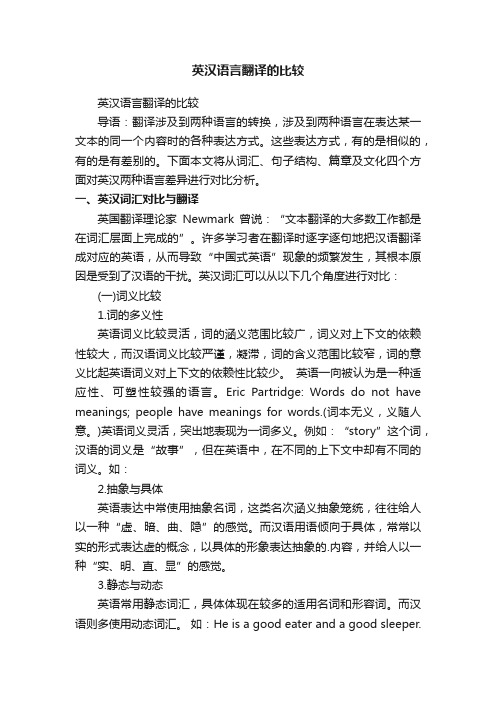
英汉语言翻译的比较英汉语言翻译的比较导语:翻译涉及到两种语言的转换,涉及到两种语言在表达某一文本的同一个内容时的各种表达方式。
这些表达方式,有的是相似的,有的是有差别的。
下面本文将从词汇、句子结构、篇章及文化四个方面对英汉两种语言差异进行对比分析。
一、英汉词汇对比与翻译英国翻译理论家Newmark曾说:“文本翻译的大多数工作都是在词汇层面上完成的”。
许多学习者在翻译时逐字逐句地把汉语翻译成对应的英语,从而导致“中国式英语”现象的频繁发生,其根本原因是受到了汉语的干扰。
英汉词汇可以从以下几个角度进行对比:(一)词义比较1.词的多义性英语词义比较灵活,词的涵义范围比较广,词义对上下文的依赖性较大,而汉语词义比较严谨,凝滞,词的含义范围比较窄,词的意义比起英语词义对上下文的依赖性比较少。
英语一向被认为是一种适应性、可塑性较强的语言。
Eric Partridge: Words do not have meanings; people have meanings for words.(词本无义,义随人意。
)英语词义灵活,突出地表现为一词多义。
例如:“story”这个词,汉语的词义是“故事”,但在英语中,在不同的上下文中却有不同的词义。
如:2.抽象与具体英语表达中常使用抽象名词,这类名次涵义抽象笼统,往往给人以一种“虚、暗、曲、隐”的感觉。
而汉语用语倾向于具体,常常以实的形式表达虚的概念,以具体的形象表达抽象的.内容,并给人以一种“实、明、直、显”的感觉。
3.静态与动态英语常用静态词汇,具体体现在较多的适用名词和形容词。
而汉语则多使用动态词汇。
如:He is a good eater and a good sleeper.他能吃又能睡。
4.构词法(1)英语主要构词法有派生、转化和合成三种,汉语主要有派生、转化、合成、重叠四种。
(2)英语派生可用于名词、动词、形容词等,汉语派生只用于名词。
(3)重叠是汉语主要构词法之一,英语则无重叠法。
中英成语中动物词汇对比翻译

三、社会文化方面
社会习俗是文化的组成部分之一,而语言又是文化的 承载者,因此英汉习俗差异反映在语言中是多方面的。
例如:汉语中龙是帝王、力量、男性、高贵的象征,汉
语中与龙有关的成语大多是褒义的。 龙腾虎跃、卧虎藏龙、龙马精神
在英语国家,龙却被认为是邪恶的化身,大多带有贬义 。
dragons and fishes jumbled together(鱼龙混杂)
一、生态文化
中国自古以来就是农业大国,属于典型的 地农耕文化,因此与农业有关的 成语很多。 例如:瓜熟蒂落、解甲归田、拔苗助长
英国是岛国,海洋性气候,航海业发达,很 多成语源于航海事业 。 例如:to burn one’s boat 破釜沉舟
plain sailing 一帆风顺 go with the stream 随波逐流
意译法
• 在直译和借用汉语成语都不妥当时,为了 表达确切的原意,可进行意译
叶公好龙 : professed love of what one really fears 毛遂自荐: volunteer one ‘s service 初出茅庐: at the start of one’s career
• This added fuel to the fire of the old lady's anger,“Who ordered coffins?”
seek truth from facts 实事求是 to pour oil on fire 火上浇油 eye for eye and tooth for tooth 以牙还牙 All crows are equally black , all wolves eat meats. 天下乌鸦一般黑,老狼都是吃肉的。
英汉语比较与翻译6 代词

• 在照应这一手段中,英汉语篇最显著的差别是:英 语有关系代词,而且使用频率很高;而汉语没有关 系代词,因此在很多情况下,汉语中的人称代词在 译文中常常可以用英语中的关系代词表示。如:
• 这张条子是安娜留的,她刚才到这儿来过。 • This note was left by Anna, who was here a moment ago.
• There is no doubt about it; you are the student who impressed me deeply. (cataphora) 下指/后指
• According to their meanings, adverbial clauses can be divided into nine kinds. (cataphora) 下指/后指
• 2. 询问敲门人“你是谁”时,由于不明对方身份, 用it。 • --Bang bang bang! (Knocking at the door) • --Who is it? (“it”指“你”) • 3. 劝吃东西时用自身代词。例如: • 请你随便吃些蛋糕吧。 • Help yourself to the cakes.
• 代词可以代替短语、句子,甚至一大段话语表达的意思。 它 能指代人物、时间、地点、数量、程度和事件。 • Your spoken English is excellent; I will not forget it. (anaphora) 前指 • I gave my wife a fur coat for her birthday, which pleased her a lot. (anaphora) 前指
• 3. 在成人和孩童、医生和患者之间的对话中,成人、 医生常用we来称呼孩童、病人,表示“你”。 • (幼儿园阿姨对小朋友)How are we this morning? 今天早晨你好吗? • (医生对病人) Can ’ t we open our mouth a little wider? 你嘴巴再张大一点好吗? • (琴师对学生) Shall we play the tune once more? 你再弹一下这个调好吗?
英汉词语对比与翻译【打印版】
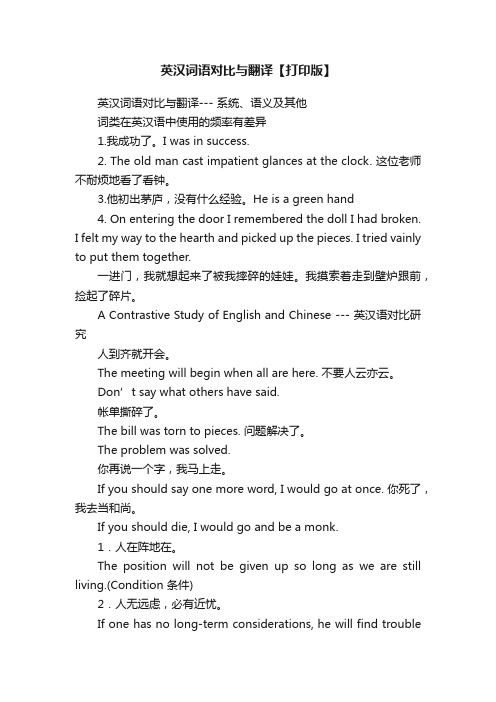
英汉词语对比与翻译【打印版】英汉词语对比与翻译--- 系统、语义及其他词类在英汉语中使用的频率有差异1.我成功了。
I was in success.2. The old man cast impatient glances at the clock. 这位老师不耐烦地看了看钟。
3.他初出茅庐,没有什么经验。
He is a green hand4. On entering the door I remembered the doll I had broken.I felt my way to the hearth and picked up the pieces. I tried vainly to put them together.一进门,我就想起来了被我摔碎的娃娃。
我摸索着走到壁炉跟前,捡起了碎片。
A Contrastive Study of English and Chinese --- 英汉语对比研究人到齐就开会。
The meeting will begin when all are here. 不要人云亦云。
Don’t say what others have said.帐单撕碎了。
The bill was torn to pieces. 问题解决了。
The problem was solved.你再说一个字,我马上走。
If you should say one more word, I would go at once. 你死了,我去当和尚。
If you should die, I would go and be a monk.1.人在阵地在。
The position will not be given up so long as we are still living.(Condition 条件)2.人无远虑,必有近忧。
If one has no long-term considerations, he will find troubleat his doorstep.(Condition 条件)3.病来如山倒,病去如抽丝。
- 1、下载文档前请自行甄别文档内容的完整性,平台不提供额外的编辑、内容补充、找答案等附加服务。
- 2、"仅部分预览"的文档,不可在线预览部分如存在完整性等问题,可反馈申请退款(可完整预览的文档不适用该条件!)。
- 3、如文档侵犯您的权益,请联系客服反馈,我们会尽快为您处理(人工客服工作时间:9:00-18:30)。
汉译英中的词义选择
• 1. 根据语境选择合适词义
• “Each word is a new word in a new context.” (Firth, British linguist) • • • • • • • 例1:“好” ①. 好的开始是成功的一半。 Well begun, half done. ②. 邻居对我都很好。 My neighbors are all very kind to me. ③. 这个问题好解决。 The problem can be easily solved.
• • • •
④. 计划定好了。 The plan has been drawn up. ⑤. 你留个电话,有事好联系你。 Give me your telephone number so that I can contact you when necessary. • ⑥. 今天下午好几个人过来找你。 • Quite a few people came in looking for you this afternoon. • • • • • • • 例2:“轻巧” ①. 这摩托车很轻巧。 The motorcycle is light and handy. ②. 她动作很轻巧。 She is nimble in movement. ③. 你说得倒轻巧,你也给捧个奖杯回来。 You talk as if it were just a walkover. Why not try yourself and see if you can bring back a trophy, too?
• (3) 他们的拉车姿势,讲价时的那随机应变,走路时的抄 近绕远,都足以使他们想起过去的光荣,而且用鼻翅扇 着那些后起之辈。” • (老舍《骆驼祥子》) • Their pulling posture, their adroit bargaining, their shrewd use of short-cuts or circuitous routes are enough to make them relive past glories and turn up their noses at the younger generation. • “用鼻翅扇着”:这个动作(指称意义)表示对某人的轻视 (蕴涵意义) • “turn one's nose up at sth.”意为“treat sth. with contempt”形 象与意义与原文完全相符。
• 当汉语文化中特有的事物在英语文化中完全空缺时, 可采用音译法将这些具有特殊文化内涵的词语“移植” 到英语文化中。 • 气功 • Qigong • 太极 • Taichi • 风水 • Fengshui • 阴阳 • Yin-yang • 馄饨 • Wonton
• 有些词语,采用直译,既可以使译文简洁,又能保留汉语 文化词语的原汁原味,不会产生文化误解。 • 易经 • Book of changes • 号脉 • Feel the pulse • 京剧 • Peking Opera • 龙舟 • Dragon boat • 春节 • Spring Festival • 站票 • Standing-room-only tickets
• 在直译无法达到效果的情况下,可采用意译。 • 意译法舍弃了词语的语言形式和字面意义,着眼于传 达词语的文化信息。 • 皮蛋 • Preserved egg • 元宵 • Sweet dumplings made of glutinous rice flour • 拜堂 • Perform the marriage ceremony • 拔火罐 • Cupping • 乌纱帽 • an official post
加注法,通过注释的形式在译文中补充必要的文化 背景知识,以弥补汉英文化的差异。
• 1. 八卦 • 直译:the Eight Trigrams • 加注: the Eight Trigrams (Eight combinations of three lines—all solid, all broken, or a combination of solid and broken lines— joined in pairs to form 64 hexagrams, formerly used in divination.)
• 3. 满月酒 • 加注:One-month-old birthday feast(a special ceremony held after a baby has been one month old) • 4. 秀才 • 加注:Xiucai, one who passed the imperial examination at the country level in the Ming and tic correspondence)
• (1). 有些词语,特别是名词,在没有特指语境的情况 下,只具备指称意义。 • 例如:山 (mountain)、水 (water)、湖泊 (1ake)、森林 (forest)、阳光 (sunshine)、沙漠 (desert)、苹果 (apple)、 蔬菜 (vegetable)、医生 (doctor)、学校 (school)、工厂 (factory)、教师 (teacher)、学生 (student)、历史博物 馆 (history museum)、历史遗产 (historical heritage)、 温室效应 (greenhouse effect)、环境保护 (environmental protection)等。 • 它们都可以用英语中词义相符的词语译出。
汉英词语比较与翻译
汉英词语对比
• 汉英词语关系比较复杂,这是语言和文化的异同 造成的。 • 大致将其归纳为: • 1.词义相符(semantic correspondence) • 指称意义和蕴涵意义相符; • 2.词义相异(semantic non-correspondence) • 指称意义相符但蕴涵意义相异,或指称意义与蕴 涵意义均相异; • 3.词义空缺(semantic zero) • 汉语词语的指称意义或蕴涵意义在英语中不存在, 造成零指称意义或零蕴涵意义。
• 6.东郭先生 • 加注:Mr. Dongguo (the foolish, softhearted scholar who narrowly escaped being eaten by a wolf which he had helped to hide from a hunter in a Chinese folk tale. Later, it refers to a naï ve person who gets into trouble through being softhearted to evil people)
2. 词义相异 (semantic non-correspondence)
• (1)指称意义相符,蕴涵意义相异 • 松、梅、竹在汉文化中称为“岁寒三友”,象征 着不畏严寒,傲然风雪的品德 • pine trees、plum blossoms 和 bamboo 在英语 中不具备松、梅、竹在汉文化中的蕴涵意义。
• (2).有些词语既有指称意义,也有蕴涵意义。 • (1) 他是只狡猾的老狐狸。 • He is an old fox. • 狐狸 (fox) 在汉语和英语中的指称和蕴含意义相同 • (2) 那本书的作者似乎没有自己的观点,书里都是人 云亦云的东西。 • That book, whose author doesn't seem to have his own viewpoints, is full of parrot-learned knowledge. • 在汉语和英语中都具有“人云亦云”、“鹦鹉学舌”的 贬义
• “羊”:用羊合成的汉字多为褒义。 • 例如:美、羞、鲜、義(义)等
• 三羊开泰 • (Three Rams Bring Bliss) 常用来表示人们希求开年大吉 的心愿。 • ram :表示“公羊”,还表示“撞击装置” • Goat:替罪羊,色鬼 • Sheep:胆小鬼 • 熊 bear • C:愚笨, 窝囊 • E:脾气暴烈或鲁莽的人 • 猫头鹰 owl • C:厄运,凶兆 • E:聪明,智慧
• 例3:“考察”
• ①. 中国明朝著名旅行家徐霞客一生周游考察了16 个省份,足迹几乎遍及全国。 • In his lifetime, Xu Xiake, a great traveler in China’s Ming Dynasty, toured 16 provinces, leaving his footmarks in nearly every corner of the country. • ②. 他总是选择道路艰险的山区、人迹罕至的森林 进行考察。 • He always preferred to venture into mountainous areas with rough tracks, and into forests seldom visited by human beings.
• (2).指称意义和蕴涵意义相异
• “龙凤呈祥”
• Dragon and Phoenix Bringing Prosperity • The Union of A Dragon and A Phoenix Foretells / Brings Good Fortune — Symbol of Harmony and Prosperity
• 5. 铁饭碗 • 加注:iron rice bowl, a job that is stable, reliable, and guaranteed for life
• 5. 牛郎织女 • 加注:the Cowherd and the Girl Weaver—two figures in an ancient Chinese fairy tale (Later it also refers to husband and wife who live far apart)
